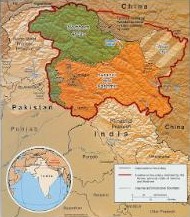The commando-style terror attack in Mumbai, India, that claimed nearly 200 lives in late November highlights the ongoing danger Islamic extremists pose to even the most developed democracy in South Asia. The attack -- and the diplomatic maneuvering in its wake -- also casts light on the increasingly important network of relationships between India, Pakistan, Afghanistan and the United States. These four countries -- three of them nuclear states -- will likely decide the future of South Asia in an era of terrorism, coalition warfare and national rapprochement. The U.S.-led "war on terror," which has seen scores of nations deploy troops and non-military resources to Afghanistan and other battlegrounds, has been a catalyst for remarkable change in old rivalries in the region. Pakistan's elected leadership has made efforts to improve cooperation with the developed world in combating extremism in its lawless border region with Afghanistan. Islamabad's coming-out has even involved a slow, and separate, process of reconciliation with New Delhi, with which it has fought four wars since Pakistan's independence from India in 1947. Prior to the Mumbai attacks, India and Pakistan were on course to sign a broad agreement for economic cooperation that would have represented a big step forward in the two countries' relations. Early indications that the Mumbai terrorists hailed from, or received support from, Pakistan, have threatened to stall the trade measure. Still, the lines of communication between New Delhi and Islamabad have remained open throughout the present crisis -- and that alone is encouraging. "They have talked on the telephone," U.S. Secretary of State Condoleezza Rice said as she prepared to travel to the region in the wake of the attacks. "This is a different relationship than it was a number of years ago."
The Pakistan Problem: Four Countries’ Relations Will Decide Region’s Future

